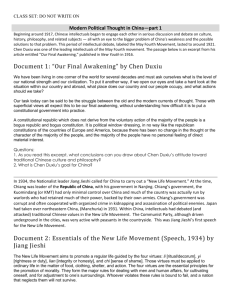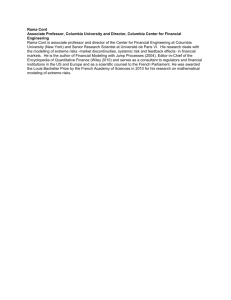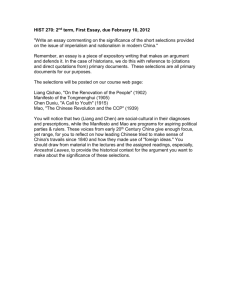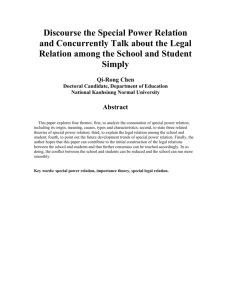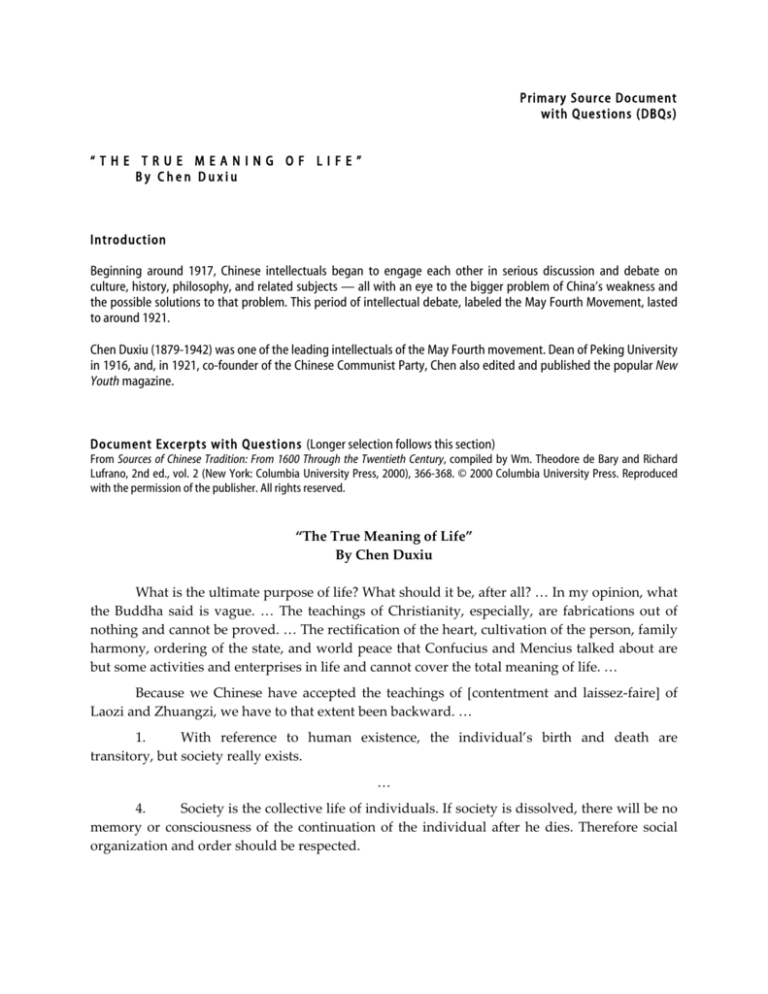
Primary Source Document
with Questions (DBQs)
“THE TRUE MEANING OF LIFE”
By Chen Duxiu
Introduction
Beginning around 1917, Chinese intellectuals began to engage each other in serious discussion and debate on
culture, history, philosophy, and related subjects — all with an eye to the bigger problem of China’s weakness and
the possible solutions to that problem. This period of intellectual debate, labeled the May Fourth Movement, lasted
to around 1921.
Chen Duxiu (1879-1942) was one of the leading intellectuals of the May Fourth movement. Dean of Peking University
in 1916, and, in 1921, co-founder of the Chinese Communist Party, Chen also edited and published the popular New
Youth magazine.
Document Excerpts with Questions (Longer selection follows this section)
From Sources of Chinese Tradition: From 1600 Through the Twentieth Century, compiled by Wm. Theodore de Bary and Richard
Lufrano, 2nd ed., vol. 2 (New York: Columbia University Press, 2000), 366-368. © 2000 Columbia University Press. Reproduced
with the permission of the publisher. All rights reserved.
“The
True
Meaning
of
Life”
By
Chen
Duxiu
What
is
the
ultimate
purpose
of
life?
What
should
it
be,
after
all?
…
In
my
opinion,
what
the
Buddha
said
is
vague.
…
The
teachings
of
Christianity,
especially,
are
fabrications
out
of
nothing
and
cannot
be
proved.
…
The
rectification
of
the
heart,
cultivation
of
the
person,
family
harmony,
ordering
of
the
state,
and
world
peace
that
Confucius
and
Mencius
talked
about
are
but
some
activities
and
enterprises
in
life
and
cannot
cover
the
total
meaning
of
life.
…
Because
we
Chinese
have
accepted
the
teachings
of
[contentment
and
laissez‑faire]
of
Laozi
and
Zhuangzi,
we
have
to
that
extent
been
backward.
…
1.
With
reference
to
human
existence,
the
individual’s
birth
and
death
are
transitory,
but
society
really
exists.
…
4.
Society
is
the
collective
life
of
individuals.
If
society
is
dissolved,
there
will
be
no
memory
or
consciousness
of
the
continuation
of
the
individual
after
he
dies.
Therefore
social
organization
and
order
should
be
respected.
Primary Source Document, with Questions (DBQs) on
“THE TRUE MEANING OF LIFE,” BY CHEN DUXIU
…
6.
All
religions,
laws,
moral
and
political
systems
are
but
necessary
means
to
preserve
social
order.
They
are
not
the
individual’s
original
purpose
of
enjoyment
in
life
and
can
be
changed
in
accordance
with
the
circumstances
of
the
time.
…
9.
To
enjoy
happiness,
do
not
fear
suffering.
Personal
suffering
at
the
moment
sometimes
contributes
to
personal
happiness
in
the
future.
For
example,
the
blood
shed
in
righteous
wars
often
wipes
out
the
bad
spots
of
a
nation
or
mankind.
Severe
epidemics
often
hasten
the
development
of
science.
Questions:
1. Analyze Chen Duxiu’s attitude toward Confucian philosophy as revealed in
these passages. To what extent does he accept, follow, or reject the
Confucian philosophical/moral heritage?
2. Compare Chen’s attitude toward the Chinese cultural heritage with that of
Liang Shuming.
3. Analyze Chen’s attitude toward Buddhism and Daoism. To what extent does
he accept or reject Buddhist and/or Daoist philosophy? To what extent is he
influenced by these philosophies?
Longer Selection
From Sources of Chinese Tradition: From 1600 Through the Twentieth Century, compiled by Wm. Theodore de Bary and Richard
Lufrano, 2nd ed., vol. 2 (New York: Columbia University Press, 2000), 366-368. © 2000 Columbia University Press. Reproduced
with the permission of the publisher. All rights reserved.
“The
True
Meaning
of
Life”
By
Chen
Duxiu
What
is
the
ultimate
purpose
in
life?
What
should
it
be,
after
all?
…
From
ancient
times
not
a
few
people
have
offered
explanations.
…
In
my
opinion,
what
the
Buddha
said
is
vague.
Although
the
individual’s
birth
and
death
are
illusory,
can
we
say
that
humanity
as
a
whole
is
not
really
existent?
…
The
teachings
of
Christianity,
especially,
are
fabrications
out
of
nothing
and
cannot
be
proved.
If
God
can
create
the
human
race,
who
created
Him?
Since
God’s
existence
or
nonexistence
cannot
be
proved,
the
Christian
philosophy
of
life
cannot
be
completely
believed
in.
The
rectification
of
the
heart,
cultivation
of
the
person,
family
harmony,
ordering
of
the
state,
and
world
peace
that
Confucius
and
Mencius
talked
about
are
but
some
activities
and
enterprises
in
life
and
cannot
cover
the
total
meaning
of
life.
If
we
are
totally
to
sacrifice
ourselves
to
benefit
others,
then
we
exist
for
others
and
not
for
ourselves.
This
is
definitely
not
the
fundamental
reason
for
man’s
existence.
The
idea
[of
altruism]
of
Mozi
is
also
Asia for Educators | Columbia University | http://afe.easia.columbia.edu
Page 2 of 4
Primary Source Document, with Questions (DBQs) on
“THE TRUE MEANING OF LIFE,” BY CHEN DUXIU
not
free
from
one‑sidedness.
The
doctrines
of
Yang
Zhu
[fourth
century
BCE?]
and
Nietzsche
fully
reveal
the
true
nature
of
life,
and
yet
if
we
follow
them
to
their
extremes,
how
can
this
complex,
organized,
and
civilized
society
continue?
…
Because
we
Chinese
have
accepted
the
teachings
[of
contentment
and
laissez‑faire]
of
Laozi
and
Zhuangzi,
we
have
to
that
extent
been
backward.
Scientists
say
that
there
is
no
soul
after
a
man’s
death.
…
It
is
difficult
to
refute
these
words.
But
although
we
as
individuals
will
inevitably
die,
it
is
not
easy
for
the
whole
race
or
humanity
to
die
off.
The
civilization
created
by
the
race
or
humanity
will
remain.
It
is
recorded
in
history
and
will
be
transmitted
to
later
generations.
Is
this
not
the
consciousness
or
memory
of
our
continuation
after
death?
From
the
above,
the
meaning
of
life
as
seen
by
the
modern
man
can
be
readily
understood.
Let
me
state
it
briefly
as
follows:
1.
With
reference
to
human
existence,
the
individual’s
birth
and
death
are
transitory,
but
society
really
exists.
2.
The
civilization
and
happiness
of
society
are
created
by
individuals
and
should
be
enjoyed
by
individuals.
3.
Society
is
an
organization
of
individuals
—
there
can
be
no
society
without
individuals.
…
The
will
and
the
happiness
of
the
individual
should
be
respected.
4.
Society
is
the
collective
life
of
individuals.
If
society
is
dissolved,
there
will
be
no
memory
or
consciousness
of
the
continuation
of
the
individual
after
he
dies.
Therefore
social
organization
and
order
should
be
respected.
5.
To
carry
out
one’s
will
and
to
satisfy
his
desires
(everything
from
food
and
sex
to
moral
reputation
is
“desire”)
are
the
basic
reasons
for
the
individual’s
existence.
These
goals
never
change.
(Here
we
can
say
that
Heaven
does
not
change
and
the
Way
does
not
change
either.)
6.
All
religions,
laws,
moral
and
political
systems
are
but
necessary
means
to
preserve
social
order.
They
are
not
the
individual’s
original
purpose
of
enjoyment
in
life
and
can
be
changed
in
accordance
with
the
circumstances
of
the
time.
7.
People’s
happiness
in
life
is
the
result
of
their
own
effort
and
is
neither
the
gift
of
God
nor
a
spontaneous
natural
product.
If
it
were
the
gift
of
God,
how
is
it
that
He
was
so
generous
with
people
today
and
so
stingy
with
people
in
the
past?
If
it
is
a
spontaneous,
natural
product,
why
is
it
that
the
happiness
of
the
various
peoples
in
the
world
is
not
uniform?
8.
The
individual
in
society
is
comparable
to
the
cell
in
the
body.
Its
birth
and
death
are
transitory.
New
ones
replace
the
old.
This
is
as
it
should
be
and
need
not
be
feared
at
all.
9.
To
enjoy
happiness,
do
not
fear
suffering.
Personal
suffering
at
the
moment
sometimes
contributes
to
personal
happiness
in
the
future.
For
example,
the
blood
shed
in
righteous
wars
often
wipes
out
the
bad
spots
of
a
nation
or
mankind.
Severe
epidemics
often
hasten
the
development
of
science.
In
a
word,
what
is
the
ultimate
purpose
in
life?
What
should
it
be,
after
all?
I
dare
say:
Asia for Educators | Columbia University | http://afe.easia.columbia.edu
Page 3 of 4
Primary Source Document, with Questions (DBQs) on
“THE TRUE MEANING OF LIFE,” BY CHEN DUXIU
During
his
lifetime,
an
individual
should
devote
his
efforts
to
create
happiness
and
to
enjoy
it,
and
also
to
keep
it
in
store
in
society
so
that
individuals
of
the
future
may
also
enjoy
it,
one
generation
doing
the
same
for
the
next
and
so
on
unto
infinity.
Asia for Educators | Columbia University | http://afe.easia.columbia.edu
Page 4 of 4




